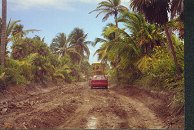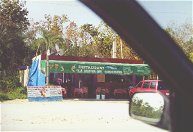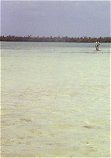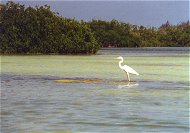Murder, sex, mystery and bonefish. This is the true story of a not quite ordinary day on Mexico's Yucatan peninsula.

Punta Allen is a small and tattered town at the end of the coast road running down along the Yucatan peninsula south of Tulum. Most of the people who live here — and there aren't many — earn a small living fishing the waters off the coast or selling trinkets to the few tourists who find their way down here. At times, it seems that there are more dogs than people out on the hot and dusty streets. At least at mid-day.

The road to Punta Allen
After asking about, I finally found the restaurant I'd been directed to. It was no more than a low and shabby house on the edge of a sandlot ball field. I could tell with one look that it wasn't a five-star eatery but more of a place that just sold "food." Maybe cooked, maybe not. Maybe edible, maybe not. But I was hungry and tired after a long drive down and it didn't much matter at the time. Later, actually not much later, I began to give it more thought.
Once inside the house/restaurant, which was called simply Casa Verde, or the Green House, I wasn't at all surprised to find that the dining "sala" consisted of little more than a few picnic tables arranged under a tarpaulin that was attached to the side of the house and that this sala was next to the "kitchen," which in itself seemed less a space to cook in than a place to keep dirt and old clothes. From my bench, I could see the oil-blackened cauldrons that were being constantly churned by a toothless old woman and smell the smoke of the driftwood fires that smelled more of burning paint and tar than of wood. I began to feel that I had somehow gone back in time and stumbled into the slave quarters of some unsuccessful back country plantation. To add to the general misery of this scene, there were two cadaverous dogs and three skeletal cats that roamed about the place, accompanied by innumerable, even scrawnier chickens, all hoping, I was sure, that I would throw them some scraps. It seemed that all living creatures here were hungry. Including me.
But before ordering I made the mistake — or maybe it wasn't such a mistake, after all — of going to the bano, which was really no more than a low wooden outhouse with no roof and a splintery, crusted plank to sit on — if you dared. This wasn't really so bad as such things go and I hadn't expected much more. But what bothered me more than a bit were the chickens that lined up on top of the walls and just sort of hovered there. I could sense they were impatient for me to leave so that they could hop down to look for some scrap of undigested food. I obliged them as soon as I could and returned to the sala.
But this was the best restaurant in town, I'd been told, and I didn't have the heart now to go and look for the second best restaurant in town. And so, being somewhat aware of cultural differences and not knowing much of the lingo — and with a growing suspicion that what we call household pets might be called in this place soup de jour, I decided to order some hard-boiled eggs and a bottle of beer. I had already decided against the chicken — which, not surprisingly, was the specialty of the house.
 The beer arrived and I drank it with pleasure,
more pleasure than I had had all day. The day was hardly half
over but already I was feeling that I should never have ventured
out of my tent that morning. I should have simply poked my head
out into the fresh air, looked at the palm trees, the picturesque
cove, the sun above, and with a smile and a yawn crawled back
into the rumpled comfort of my sack and reentered that dream about
the bonefish with the pearl in its snout. But I didn't. Fooled
by the beauty of the day and by my own high hopes, I pushed back
the tent flap and walked straight into a bad dream.
The beer arrived and I drank it with pleasure,
more pleasure than I had had all day. The day was hardly half
over but already I was feeling that I should never have ventured
out of my tent that morning. I should have simply poked my head
out into the fresh air, looked at the palm trees, the picturesque
cove, the sun above, and with a smile and a yawn crawled back
into the rumpled comfort of my sack and reentered that dream about
the bonefish with the pearl in its snout. But I didn't. Fooled
by the beauty of the day and by my own high hopes, I pushed back
the tent flap and walked straight into a bad dream.
It all started innocently enough. First things first, I poured some water into a bean can and set it on the little primus stove to boil for coffee. While it was heating up I went for a short walk along the beach towards where I had parked my rental car under a small stand of trees just off the road. So far so good.
But good began to look bad when I rounded a little promontory and saw three men standing outside my car and two sitting inside. The three men standing outside were leaning against palm trees, smoking and watching my approach with what seemed great interest. One of the men inside the car looked like he was going through my bags. The other one was definitely going through the contents of the glove compartment. I began to wish that I had stayed with stamp collecting and never taken up flyfishing — or at least flyfishing in the tropics.
If you're ever seen the movie, Treasure of the Sierra Madre you'll remember the banditos that plagued Fred C. Dobbs and his mining partners. These Guys looked just like Those Guys. Mean-looking hombres they were, right down to the gold teeth and the grins that said you can run but you can't hide. But there was no place hide (I think I knew this instinctively) and so with a false courage I never knew I had I feigned indifference, smiled stupidly, and walked slowly over to them, all the time hoping against hope that they were really from the tourist bureau and had just stopped by to see how I was getting along.
But they weren't from the tourist bureau. Of course they weren't; I knew they wouldn't be. It was just a crazy hope. But lucky for me (sort of) they weren't banditos either. They were plainclothes federales who flashed some identification and made me stand with my head against a palm trunk while they frisked me. Then they began to question me in pidgin English or Spanish or some other incomprehensible tongue. I responded in kind. Naturally I couldn't understand all their questions and they couldn't understand all my answers — who really knew who was saying what — but after half an hour of linguistic ping pong they seemed satisfied with my papers and with my answers and headed on down the road in an old Chevy Monte Carlo with one door just barely on its hinges. Just before they handed me back my papers and departed, they left me there with a vague and unsettling warning about thieves and murderers in the area — and here the head man made a slash-across- the-throat motion. I understood what he meant and before they were out of sight I walked back to my tent and quickly broke camp.
Half an hour later I stopped at a small cafe along the road down to Punta Allen. It was then that I discovered the reason for the federales' visit.
A murder had been committed the night before about a mile down the beach from where I had camped. The murder was about drugs, sex, money, revenge, a medley of all the usual motives. What was unusual was that this bludgeon-murderer was an American, a tall American who, said the German telling me this story, looked a lot like me.
Fortunately for me, this guy had a name that was known — and it wasn't mine. But try to explain that to the people who had pointed at me and backed off when they saw me get out of the car and walk up to the cafe. And who were still standing across the road staring in at me. They probably thought the bludgeoner had returned. I thanked the German and walked out of the bar, back to the car, and drove off.
After mulling over these events through three beers at the Casa Verde, I paid up and stepped out into the furnace of mid-afternoon in the Yucatan. A ball game had begun on the sandlot but there was no shade and I stayed around for only a minute or so, just long enough to watch a baseball game played with no gloves.
It was still much too hot to wander around the flats in search of bonefish, which was why I had come to this place, and it was certainly much too hot to wander long around this shadeless place and so when I came across a small circus tent out on the fringes of town, I paid the few pesos at the ticket stall and walked into the shade of the tent, happy to simply get out of the sun for a bit.
The circus was called "El Circo de Roberto," or as we would put it, Bob's Circus, which makes it sound a little less grand and more like what it really was. Which wasn't much. Just Roberto himself and his idiot assistant, along with the world's ugliest parrot, a be-ribboned horse that had seen better days, a peccary that just lay on the ground and grunted, and a small family of monkeys that had long ago been trained to steal from the spectators. With the exception of the duck, that was about it. These were the "wonders!" that had been promised the ticket buyers.
But the duck was the highlight of the circus, or so it seemed at the time. It was a dancing duck that hopped about and kept time to mariachi rhythms played on a windup Victrola. The duck's dancing and sense of timing were actually quite impressive — and very funny, too, in a queer sort of way — funny, that is, until you noticed that the duck was actually tethered to a kind of hot plate and that when Roberto wanted it to dance at a faster tempo, he simply turned up the heat. Besides the duck, I think I was the only one who noticed.
When Roberto motioned the audience (all seven or eight of us) to come closer and held before us his right hand, which sported six fingers, I decided that I had seen enough "wonders" for one day and sneaked out through the open entrance flap.
The sun was much lower in the sky now as I walked back to where I had parked the car and the air seemed to be cooling off a bit. It was time now to go fishing.
I drove the rental car down around the edge of town and soon found the jungle path marked out for me on a map by a friend. I gathered my gear, locked up the car, and followed the path past the cenote, a small fresh water pool that sparkled beneath an overhang of the greenest trees I had seen in Mexico. A few hundred yards along the path I came to a large lagoon that was sheltered from the wind.

Wading the flats near Punta Allen. Note the shadows of two bonefish in the foreground.
As I often do when fishing in a strange place, I tied on a long white bucktail as a "searching" pattern, snugged down the knot, and waded out across the flat towards a large mangrove island that lay about half a mile out in the lagoon. I was looking for bonefish but I'd be happy with anything, even with the small and pesky barracuda that I picked up on the first blind cast. It was a beginning.
A few casts later a much larger barracuda hit the fly and took off with most of my backing, arcing across the surface again and again before finally popping me off. It looked to be around four feet long but was probably closer to three. I tied on a new buck- tail and began another cast.
I was now close enough to the island to see among the branches of the mangroves dozens of half-dozing egrets and nesting flamingos that eyed my approach with suspicion and would flutter their wings whenever I began to work my fly through the air. Not that they cared one way or another, but if they were watching me with any attention at all they would also have seen another large barracuda take the last of my bucktails.
But I was through with barracuda fishing anyway. At least for the time being. As I waded around the western point of the island I finally saw what I had been looking for all the while: a large school of bonefish, maybe fifty or so, coming fast across the sand spit like big city cabbies searching the streets for fares, moving here and moving there,stopping here and stopping there — but only for a moment before they again moved on.

Peacock Angel
But they were moving towards me and I was ready for them. After I lost the bucktail I decided to devote the rest of the evening to bone fishing and had tied on a fly consisting of only a peacock sword inverted "wing" and a bit of tinsel for the body, finished off with a bright red head of thread. It was a variation of the old Alexandra wet fly and was a fly I'd been having great success with up and down the Yucatan. The bonefish probably took it for one of the small green crabs that were plentiful on the flats,especially around the mangroves. I called it a Peacock Angel, after a small cabalistic English cult that practices magic, positive thinking, and ritualistic ecstasy (traits which are, no doubt, common to many flyfishermen as well).
When the school was about hundred feet away from me I made my first cast. The fly landed softly and sank quickly about fifty feet in front of the lead fish. I let the fly settle into the sand for a second or so and then moved it ever so slightly. The slight movement was enough to attract the attention of the lead bone and in a second it was snatched. It wasn't a large bonefish like you find down in the Keys or in the Bahamas, only a couple of pounds, but it was still a lot of fun and put on quite a show for its size.
 I released the fish quickly and looked around
and over the flat for more bonefish. As you might expect, the school
the released bonefish had been swimming with had disappeared. There
were no more fish to be seen. Not for the moment, at any rate. A
good ten minutes or so would pass before my next sighting. Then,
just as before, a large school of bonefish swam over the spit, just
below where I could see the sand rise. Chances were good —
I guessed — that they'd swim towards me and not away from me
and so I stayed where I was and I waited. And soon they were within
casting distance again. Again I set the fly gently down about forty
feet in front of the first bone, twitched it, and was soon tied
to another fish, about the same size as the first. I released it
and then sat down in the water upon the sand to wait. There were
no other fish in sight but I was certain that if I sat there long
enough at least some fish would return to the flat.
I released the fish quickly and looked around
and over the flat for more bonefish. As you might expect, the school
the released bonefish had been swimming with had disappeared. There
were no more fish to be seen. Not for the moment, at any rate. A
good ten minutes or so would pass before my next sighting. Then,
just as before, a large school of bonefish swam over the spit, just
below where I could see the sand rise. Chances were good —
I guessed — that they'd swim towards me and not away from me
and so I stayed where I was and I waited. And soon they were within
casting distance again. Again I set the fly gently down about forty
feet in front of the first bone, twitched it, and was soon tied
to another fish, about the same size as the first. I released it
and then sat down in the water upon the sand to wait. There were
no other fish in sight but I was certain that if I sat there long
enough at least some fish would return to the flat.
While I waited I began to think that maybe there was only the one school of bonefish out and about on this flat, that when they were spooked off the flat they would go to the back side of the island, circle it in a counterclockwise direction, and then return again to cruise the flats in search of food. There seemed to be a pattern to their movements.
And so I waited, fully expecting to see the school again in about five minutes or so. And true to form — or at least the form I had imposed on the situation — the fish reappeared over the sand spit and once again headed in my direction. Again I would get up onto my haunches, cast, catch one out of the school, and the school would disperse, only to re-form about a hundred yards away and head for the east end of the mangrove island. And then the cycle would begin again. And I would still be in the same place, waiting to ambush them. Seems like they never learned. Before the evening was over I would catch over a dozen of these fish, none larger than three pounds.
As I walked back along the tangled path just as the sun was setting and the sounds of darkness began to fill the jungle, I had time to reflect on the extraordinary day that had just passed and on some of the lessons I had learned. These lessons may be of no use at all to the reader if he's ever down that way — or they may be of great use (who's to say?) — but I'll share them anyway.
- When faced with potential danger, always look for a way out. Run if you can, but if you can't, smile and look stupid. Things aren't always what they seem.
- Bonefish often swim in a counterclockwise direction when looking for food.
- Flamingos do the same thing seagulls do when they fly over your head. Only it's much bigger.
- If you're ever tempted to go to the circus in Punta Allen, don't.
- Finally, if you ever eat at the Casa Verde, never, never, NEVER order the chicken.






